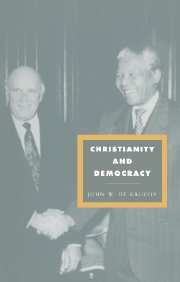Book contents
- Frontmatter
- Contents
- General editors' preface
- Acknowledgements
- Introduction
- PART I THE SYSTEM AND THE VISION
- PART II HISTORICAL AND THEOLOGICAL CONNECTIONS
- 3 The Christian matrix
- 4 The polity of modernity
- PART III CHURCHES AND THE STRUGGLE FOR DEMOCRACY
- PART IV CRITICAL THEOLOGICAL REFLECTION
- Select bibliography
- Index of names
- Index of subjects
- Cambridge Studies in Ideology and Religion
4 - The polity of modernity
Published online by Cambridge University Press: 21 January 2010
- Frontmatter
- Contents
- General editors' preface
- Acknowledgements
- Introduction
- PART I THE SYSTEM AND THE VISION
- PART II HISTORICAL AND THEOLOGICAL CONNECTIONS
- 3 The Christian matrix
- 4 The polity of modernity
- PART III CHURCHES AND THE STRUGGLE FOR DEMOCRACY
- PART IV CRITICAL THEOLOGICAL REFLECTION
- Select bibliography
- Index of names
- Index of subjects
- Cambridge Studies in Ideology and Religion
Summary
The European Enlightenment is usually located between the English Revolution of 1640 and that of France in 1789; between John Locke, the Christian believer and Jean-Jacques Rousseau, the Romantic deist. For much of the eighteenth century, there remained a Christian core to European thought which, despite confessional divisions and cultural diversity, retained some semblance of unity. Yet the chasm between an orthodoxy bent on protecting the authority of Bible, creed, and church, and secular thought was becoming unbridgeable, despite liberal Christianity's valiant attempt to redefine the essence of Christianity.
As the consensus at the heart of Christendom began to disintegrate, so the generative seams of democracy in Christianity, whether in the theological reasoning of Locke or on the more sectarian periphery, were increasingly secularized. Hence Berman's observation, quoted at the beginning of the last chapter, that liberal democracy was the first great secular religion in the West, the first ideology which was divorced from Christianity. It was the polity of modernity, and its discourse was that of bourgeois society.
REVOLUTIONS: RADICAL AND BOURGEOIS
Liberalism appealed to reason and conscience rather than to tradition, it advocated resistance to tyranny and affirmed individual human rights. Society was no longer conceived of in organic terms. The individual rather than the collective was a priori. For liberals, whether Christians or not, rationality, human autonomy, the doctrine of inevitable progress, and religious tolerance, were the fundamentals of civilized society.
The first liberals were by no means all democrats, and there are undoubtedly elements of tension between the two traditions.
- Type
- Chapter
- Information
- Christianity and DemocracyA Theology for a Just World Order, pp. 95 - 128Publisher: Cambridge University PressPrint publication year: 1995



